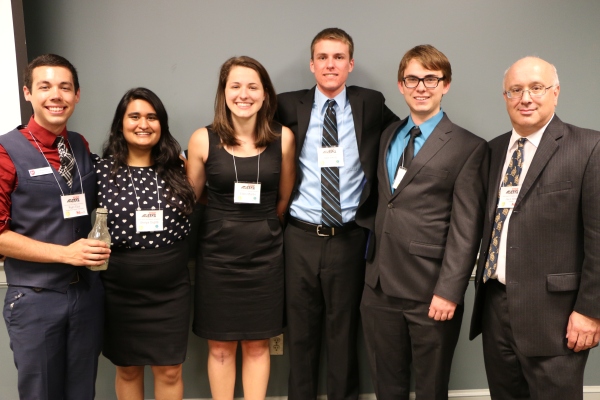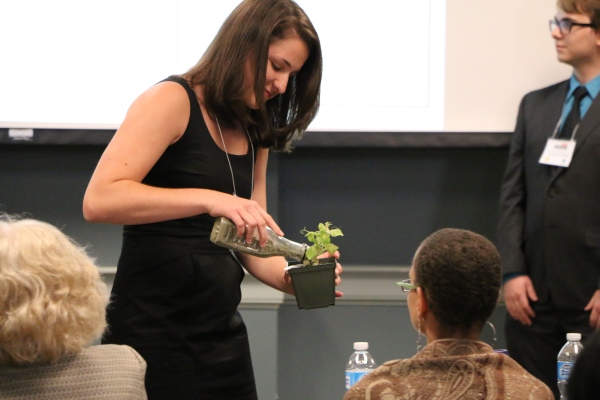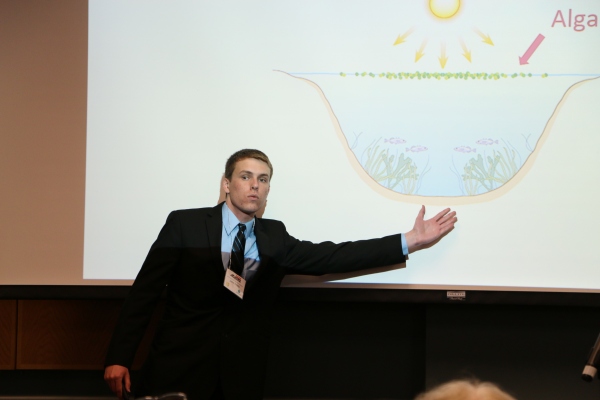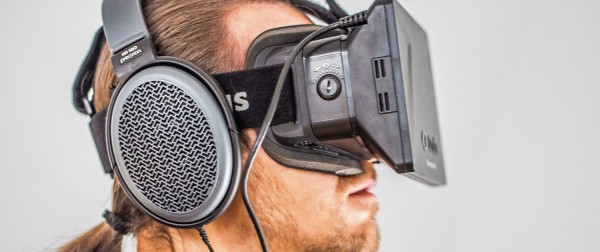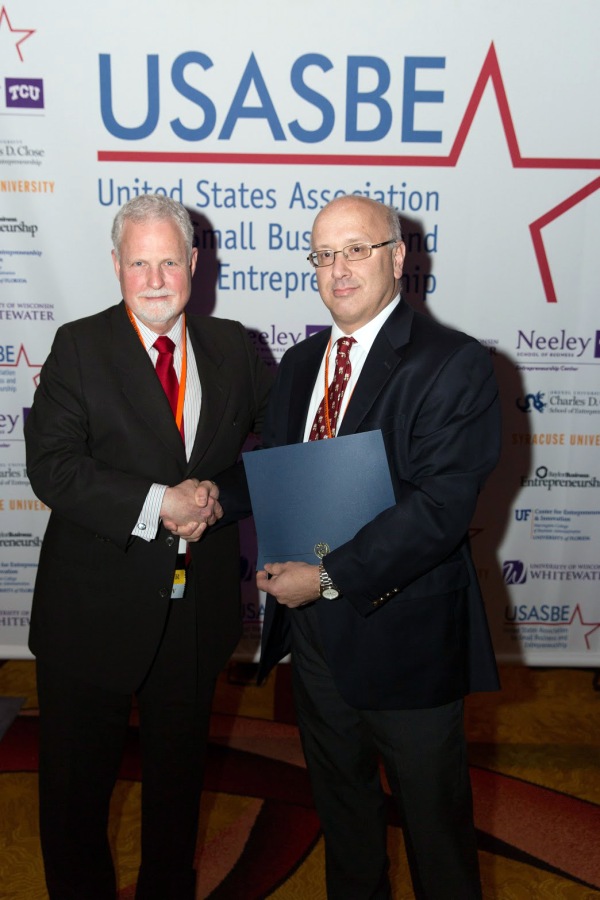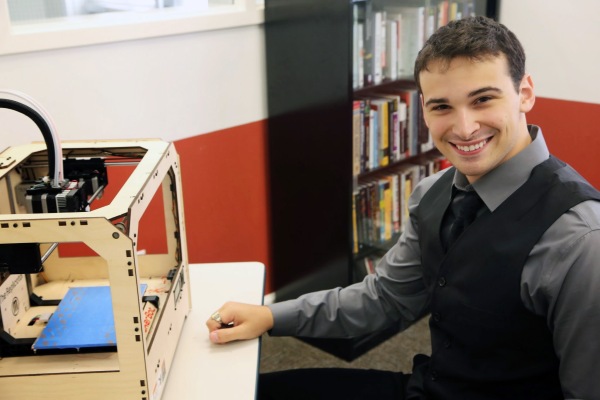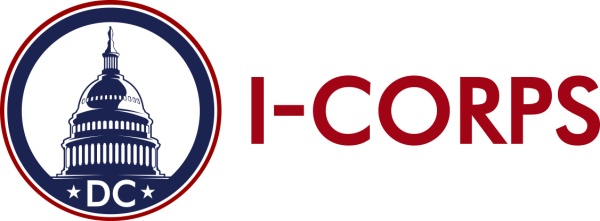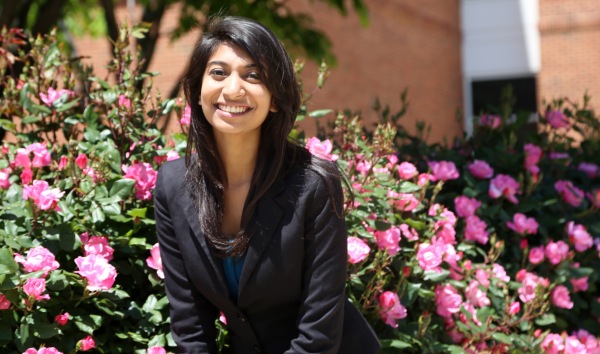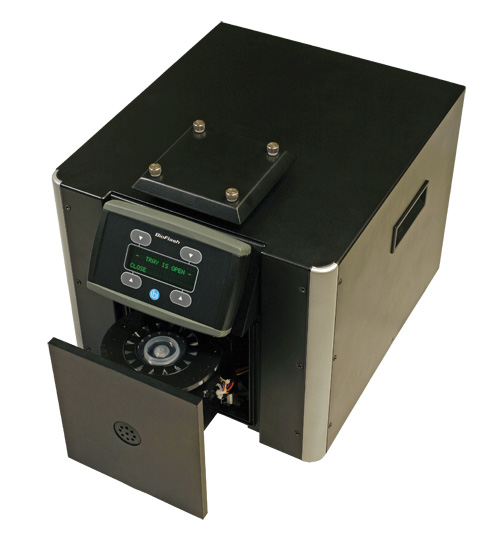Bay Bloom, a proposed company that would develop and sell an all-natural, algae-based fertilizer, won first place and $500 in the first annual Terp Tank Entrepreneurship and Innovation Program (EIP) Capstone Project Competition, held on Monday, May 11 at the University of Maryland, with more than 200 people attending.
Bay Bloom is a company idea developed by EIP students Jake Webb (Mechanical Engineering and Computer Science), Andrew Dallas (Aerospace Engineering and Computer Science), Ellen Martin (Civil Engineering–Environmental track), and Shriya Gupta (Finance and Information Systems.).
The team proposed developing an organic, algae-based fertilizer with essential components—nitrogen, phosphorous and potassium—as well as a rich array of micronutrients to stimulate plant growth. Bay Bloom’s fertilizer would release its nutrients slowly, giving plants longer access to growth stimulants while also reducing runoff into the watershed.
The algae would be grown in raceway ponds adjacent to (and using) water from the Chesapeake Bay, which would be filtered by the algae and returned as clean water throughout the process.
The Bay Bloom team estimates its fertilizer would cost $.12 per pound, which puts it in line with commercially available products.
UMD algae expert Patrick Kangas, Associate Professor in the Department of Environmental Science and Technology, provided samples for the team to work with, while Civil & Environmental Engineering lecturer Natasha Andrade mentored the team.
“I definitely want to keep developing Bay Bloom,” said Webb. “This summer we will test the fertilizer in the UMD Public Health Garden and see if it really works. We might also try and produce some packaging, get algae from Dr. Kangas and sell it at farmers’ markets nearby.”
SAT Showdown, with an idea for a turn-based, online, multiplayer SAT prep game, took second place in the competition. Third-place winner Bloomies proposed developing a reusable diaper made out of recycled materials.
“The EIP Capstone Project and Terp Tank Competition are the culmination of two years of EIP,” said Ryan Elza, academic program specialist for EIP and organizer of Terp Tank, himself a UMD Honors College alumnus. “Capstone projects address the global necessity to develop and implement solutions to critical social and environmental concerns in ways that are both technologically viable and economically sustainable.”
For their capstone, EIP second-semester sophomores worked in teams to develop a for-profit business plan that achieves a multiple bottom line of both profitability and social benefit.
“Three of our EIP classes were project-based, where we pitched ideas and formed groups around those ideas,” said Webb. “But they were all built around the first class, where we learned the entrepreneurial mindset, a better way of thinking about things. Applied over time, I saw the projects I worked on get better every year.
“Another element they teach in EIP is having a business that is as disruptive and as impactful as possible. This way of thinking definitely influenced our idea for Bay Bloom.”
Terp Tank judges included: Martha Connolly, Director, Mtech Baltimore; Erica Estrada-Liou, Director of Curriculum & Experiential Learning, Academy for Innovation & Entrepreneurship; Ronnie Gist, Associate Director, Maryland Industrial Partnerships (MIPS) program; and Adam VanWagner, Community & Student Programs Manager, Dingman Center for Entrepreneurship.
Daniel Rochkind, UMD Honors College alumnus and COO/CFO of Marker LLC, generously sponsored the Terp Tank award.
About the Entrepreneurship and Innovation Program (EIP)
The Entrepreneurship and Innovation Program (EIP) provides University of Maryland Honors College freshmen and sophomores with an interdisciplinary, living and learning education to help build the entrepreneurial mindsets, skill sets, and relationships invaluable to developing innovative, impactful solutions to today’s problems. A joint program of the Honors College and the Maryland Technology Enterprise Institute (Mtech), EIP has a proven pedigree of successful creativity and innovation-related education and achievement. Mtech has been a leading force in entrepreneurial education and innovation for more than 25 years. EIP is based directly on Mtech’s groundbreaking Hinman CEOs program, the first undergraduate living-learning entrepreneurship program in the United States.

